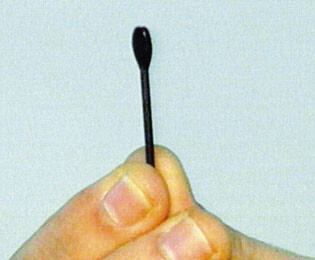Jane's Defence Weekly 22 May 2001

Military sources told Jane’s Defence Weekly that the IDF is divided about the employment of the round, with some officers arguing that the shell is effective against certain targets while others warn of an international backlash.
The IDF is using a modified version of the M494 105mm APERS-T round provided by the USA in the 1970s. According to a US Army manual, the round is “designed for close-in assault against massed infantry assaults and for offensive fire against exposed enemy personnel”.
In IDF service the M494 is fitted with the Reshef Technologies OMEGA M127 electronic fuze which is set before the round is fired. At the set range the forward section of the M494 round ruptures releasing approximately 5,000 small flechette darts and a dye marker. The flechettes are dispersed in a cone-shaped pattern which is 300m long and about 94m wide.

A flechette removed from a Bedouin man at a Gaza clinic after an alleged Israeli firing incident near Betlaha on 14 May (Source: ABC News)
Although the IDF spokesman refused to comment on operational matters, other IDF sources told JDW that commanders are under orders to use the round sparingly and insist it has been employed on only a “handful” of occasions in Gaza. They said the round is used against targets such as mortar crews who cannot be engaged effectively by automatic fire.
“The Israeli military obtained these weapons from the USA after the 1973 war and we have thousands of old shells in warehouses,” said an Israeli defence source. “The weapon is not regarded as reliable or effective and gunners have a difficult time in aiming this properly.”
Israel Military Industries has developed a 120mm APERS round and the more advanced 105mm and 120mm Anti-Personnel, Anti-Materiel (APAM) round, which is intended to defeat targets such as anti-tank teams. Military sources said the APAM has not been used against Palestinian combatants.

The M494 APERS-T round disperses about 5,000 small flechettes (left) and is fired from the 105mm gun of main battle tanks such as the Israel Defence Force’s upgraded M60s, seen here on the West Bank (Source: PA)
The use of flechette rounds in war is not proscribed by the Geneva Convention but their use in internal security operations is more problematic. A US State Department official told JDW: “There has been no determination as to whether Israel has done something to violate the Arms Export Control Act” or any other arms-related law or agreement in its recent military actions. The official added that the state and defence departments are reviewing those actions and Israel’s use of other US-supplied weapons, but refused to confirm whether the flechette rounds were specifically included.